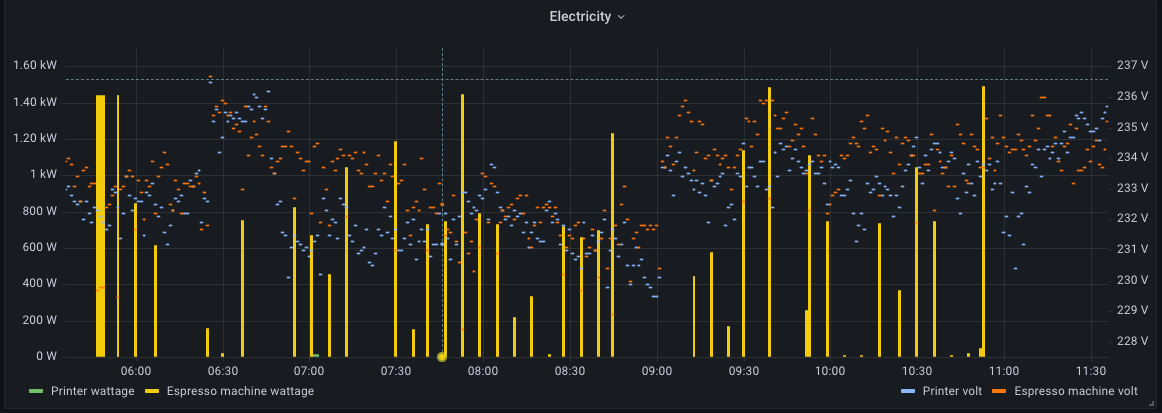149 lines
5.5 KiB
Markdown
149 lines
5.5 KiB
Markdown
|
||
<div align="center" style="background:red">
|
||
<img src="https://github.com/homebridge/branding/raw/master/logos/homebridge-wordmark-logo-vertical.png"
|
||
alt="Homebridge logo"
|
||
width="10%"/>
|
||
<img src="https://upload.wikimedia.org/wikipedia/commons/thumb/9/9e/Plus_symbol.svg/500px-Plus_symbol.svg.png"
|
||
alt="Plus sign"
|
||
width="8%"/>
|
||
<img src="https://upload.wikimedia.org/wikipedia/commons/thumb/3/38/Prometheus_software_logo.svg/115px-Prometheus_software_logo.svg.png"
|
||
alt="Prometheus logo"
|
||
width="10%"/>
|
||
</div>
|
||
|
||
# Homebridge Prometheus Exporter [](https://github.com/lstrojny/homebridge-prometheus-exporter/actions/workflows/build.yml)
|
||
|
||
> What if we could store homebridge metrics in Prometheus
|
||
|
||
*homebridge-prometheus-exporter* is a plugin for *homebridge* that provides a metrics endpoint for *Prometheus* to scrape.
|
||
Once the metrics are in *Prometheus*, they can be consumed and presented in various ways. One can use *Prometheus
|
||
Alerting Rules* to trigger actions on certain thresholds or *Grafana* to build informative graphs or alerts.
|
||
|
||

|
||
|
||
|
||
## Installing
|
||
|
||
### Install the plugin
|
||
|
||
Run this command to install the plugin as a global *nodejs* module:
|
||
|
||
```shell
|
||
npm install -g homebridge-prometheus-exporter
|
||
```
|
||
|
||
### Configure *homebridge*
|
||
|
||
Edit the *homebridge* `config.json` to load the plugin:
|
||
```json lines
|
||
{
|
||
// …
|
||
"platforms": [
|
||
{
|
||
"platform": "PrometheusExporter",
|
||
"pin": "123-12-123",
|
||
},
|
||
// …
|
||
]
|
||
}
|
||
```
|
||
|
||
### Customize *homebridge* startup
|
||
|
||
For *homebridge-prometheus-exporter* to work, *homebridge* has to run in "insecure mode". This means that any user who
|
||
has access to your network can control your *homebridge* devices. This is usually not a big problem but it is still
|
||
something you should consciously decide. *homebridge-config-ui-x*
|
||
[requires running in insecure mode](https://github.com/oznu/homebridge-config-ui-x/wiki/Enabling-Accessory-Control)
|
||
if you want to control your devices from *homebridge-config-ui-x*.
|
||
|
||
To enable "insecure mode", edit the startup script for *homebridge* and add `--insecure` or `-I`. Assuming you run
|
||
systemd, the proper way to override the config would be to use *systemd’s* drop-in mechanism.
|
||
|
||
Create `/etc/systemd/system/homebridge.service.d` folder:
|
||
```shell
|
||
mkdir /etc/systemd/system/homebridge.service.d
|
||
```
|
||
Write this drop-in configuration file to /etc/systemd/system/homebridge.service.d/insecure.conf:
|
||
```ini
|
||
[Service]
|
||
ExecStart=
|
||
ExecStart=/usr/lib/node_modules/homebridge/bin/homebridge --insecure
|
||
```
|
||
|
||
The first and empty `ExecStart` tells *systemd* to forget about the `ExecStart` from the original service definition
|
||
and the second `ExecStart` declares the new file. Run `systemctl daemon-reload` to refresh *systemd’s* unit database
|
||
and then run `systemd-delta --type=extended` to check if the drop-in worked as expected.
|
||
|
||
You should see something like this in the output:
|
||
|
||
```text
|
||
…
|
||
[EXTENDED] /lib/systemd/system/homebridge.service → /etc/systemd/system/homebridge.service.d/insecure.conf
|
||
…
|
||
```
|
||
|
||
If you are not using *systemd*, first of all, you absolutely should but second of all you will likely have some sort
|
||
of env file, e.g. `/etc/defaults/homebridge` to customize the *homebridge* start command. Restart *homebridge* using
|
||
`systemctl restart homebridge`.
|
||
|
||
Test that the metrics endpoint is available by accesing `http://homebridge-host:36123/metrics`. You should see a
|
||
response similar to this:
|
||
|
||
```text
|
||
# TYPE homebridge_air_purifier_active gauge
|
||
homebridge_air_purifier_active{name="…",…} 0 1667914208196
|
||
# TYPE homebridge_air_purifier_current_air_purifier_state gauge
|
||
homebridge_air_purifier_current_air_purifier_state{name="…",…} 0 1667914208196
|
||
```
|
||
|
||
### Configuring *Prometheus*
|
||
|
||
With *homebridge-prometheus-exporter* up and running, it is now time to configure *Prometheus* to scrape the config
|
||
endpoint. Go to your prometheus host and edit `/etc/prometheus/prometheus.yml` and add the following scrape config:
|
||
|
||
```yml
|
||
|
||
scrape_configs:
|
||
- job_name: homebridge-exporter
|
||
static_configs:
|
||
- targets:
|
||
- homebridge-host:36123
|
||
```
|
||
|
||
Once *Prometheus* is restarted, metrics with the `homebridge_` prefix should start to be ingested.
|
||
|
||
### Customize *homebridge-prometheus-exporter*
|
||
|
||
*homebridge-prometheus-exporter* offers a few advanced settings to customize its behavior.
|
||
|
||
```json lines
|
||
{
|
||
// …
|
||
"platforms": [
|
||
{
|
||
"platform": "PrometheusExporter",
|
||
// Homebridge PIN for service authentication. String of digits, format XXX-XX-XXX. Required
|
||
"pin": string,
|
||
|
||
// Toggle debug mode. Run homebridge with -D if you want to see the debug output. Default: false
|
||
"debug": boolean,
|
||
|
||
// Prefix for all metrics. Default: "homebridge"
|
||
"prefix": string,
|
||
|
||
// TCP port where the Prometheus metrics server listens. Default: 36123
|
||
"port": number,
|
||
|
||
// How frequently the services should be rediscovered (in seconds). Default: 60
|
||
"refresh_interval": number,
|
||
|
||
// Timeout for the HTTP request that retrieves the homekit devices (in seconds). Default: 10
|
||
"request_timeout": number,
|
||
|
||
// Timeout for the service discovery (in seconds). Default: 20
|
||
"discovery_timeout": number,
|
||
},
|
||
// …
|
||
]
|
||
}
|
||
```
|